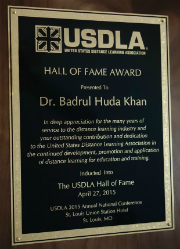Please send relevant articles and resources to khan1 @ McWeadon.com
Eight-component framework for e-learning is included on page on 127-128 in the book Educational (instructional) design models by Daniel K. Schneider (ed.)http://bigbook.or.kr/bbs/data/file/bo02/1535291005_MQ8Nsgjn_Educational_28instructional29_design_models_Daniel_K._Schneider.pdf
A Common Framework for E-learning Quality by Professor John Anderson
This paper and that which follows it are linked. They report two significant and generic contributions to the work of better understanding the pedagogic quality of e-learning. The work has been developed for Becta, the strategic education and communications technology agency for the UK. This first paper summarises a common framework for e-learning quality. The strength of the framework is that it enables all players who are interested in any aspect of the quality of e-learning, whether that is the technical, the institutional, the content, or the pedagogic, to see where and how their work relates to each or all of the other components.
A Web Based Framework for E-Learning: A Model for Online Presentation Authoring by Ferry Irawan Tantono and Chng Eng Siong
A recent trend in the E-learning community is the emergence of Learning Content Management System (LCMS). An LCMS is generally defined as a system which combines content creation and course administration tools. A model for online presentation authoring system is presented in this work, following the notion of LCMS. It serves as a framework for people to author and manage their presentation over the Internet. In particular, this project explores the potentials of Flash-based authoring tools and lays a foundation for further developments. The key advantage of the system is the convenience of online access. Simplification of the authoring tasks has also been achieved by separating the roles of the layout designer and content author. Furthermore, the system provides learners with the flexibility to view any contents using any defined layouts.
Pedagogical Models for E-Learning: A Theory-Based Design Framework by Nada Dabbagh
This paper presents a theory-based design framework for E-Learning that emphasizes the transformative interaction between pedagogical models, instructional strategies, and learning technologies. I argue that situated or distributed cognition is an appropriate foundational knowledge perspective from which to derive pedagogical models and constructs for ELearning and offers a theory-into-practice framework that characterizes the instructional implications of situated cognition and guides the design of E-Learning. Specific examples of how to apply this framework in ELearning contexts are provided.
A Strategic Framework for Designing E-Learning System with Focus on University Entrepreneurship by Masoud Asgarimehr1, et al.
One of the most important issues in the current e-learning systems, is lack of attention to university entrepreneurship topics. This article offers a strategic framework for designing e-learning system with focus on university entrepreneurship. The main goal is strategic conformity of e-learning and university entrepreneurship. In this regard, in addition to considering various aspects of e-learning system design, we will emphasize on cooperation, overlap, and matching three factors includes: government, industry and educational system to create an entrepreneur system. This framework is a strategic framework that without addressing the details, offers the overall road map for e-learning system design and this is one the advantages of this framework. Moreover, according to the second academic revolution and attention to issues of university entrepreneurship, the provided framework has special look at the production and transfer of knowledge and move toward university entrepreneurship.

